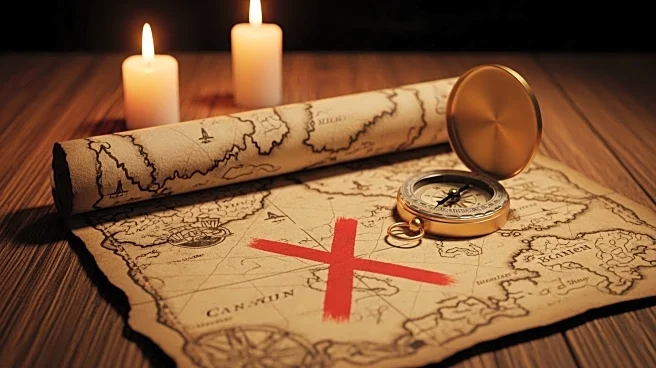What is the story about?
What's Happening?
A former fish gutter from Kent, Jack Ward, is believed to have inspired the character of Captain Jack Sparrow, famously portrayed by Johnny Depp in the Pirates of the Caribbean films. Ward, also known as John, was a late 16th-century pirate who gained notoriety for raiding Spanish ships for their gold. He amassed a fortune from his exploits on the high seas before retiring to a life of luxury in North Africa. Neil Tonge, co-author of 'The Terrible Tudors,' described Ward as having a remarkable career, transitioning from fish gutter to pirate. During Queen Elizabeth's reign, privateering licenses were sold, allowing individuals like Ward to attack Spanish ships and share the spoils with the crown. However, Ward's pirating career ended when James I ascended the throne in 1603, seeking peace with Spain. Ward fled to North Africa, becoming a Barbary pirate and living in luxury in Tunis.
Why It's Important?
The story of Jack Ward highlights the historical context of piracy during the late 16th century and its impact on international relations. Ward's actions contributed to the tension between England and Spain, influencing diplomatic strategies of the era. The character of Captain Jack Sparrow, inspired by Ward, has become a cultural icon, reflecting the romanticized view of piracy in popular media. This connection underscores the influence of historical figures on modern storytelling and entertainment, shaping public perception of pirates as adventurous and rebellious figures. The narrative also illustrates the economic motivations behind piracy, driven by the lucrative opportunities presented by privateering licenses.
What's Next?
While the historical connection between Jack Ward and Captain Jack Sparrow is intriguing, it remains speculative. The portrayal of pirates in media continues to evolve, with filmmakers and authors drawing inspiration from historical accounts to create engaging narratives. The ongoing interest in pirate lore may lead to further exploration of figures like Ward, potentially inspiring new adaptations or stories that delve deeper into the realities of piracy. As the entertainment industry seeks fresh content, historical figures may serve as a rich source of inspiration for future projects.
Beyond the Headlines
The ethical implications of romanticizing piracy are worth considering, as the real-life actions of pirates often involved violence and theft. The portrayal of pirates in media can obscure the harsh realities of their impact on trade and international relations. Additionally, the cultural fascination with pirates reflects broader themes of rebellion and freedom, resonating with audiences who admire the defiance of authority. This fascination may influence societal attitudes towards authority and governance, highlighting the complex relationship between historical narratives and contemporary values.















